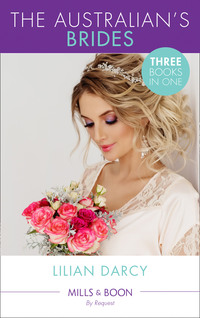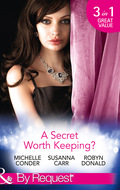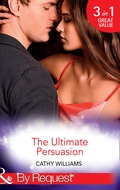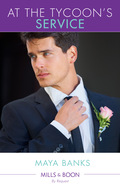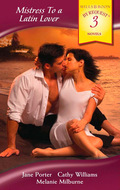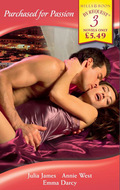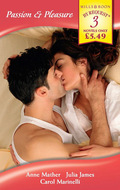Kitap dosya olarak indirilemez ancak uygulamamız üzerinden veya online olarak web sitemizden okunabilir.
Kitabı oku: «The Australians' Brides», sayfa 2
“Tuesday.” He relaxed a little more. “So you’re obviously not serious about tonight, either.”
“No.”
“Thank heavens we got that established nice and early!”
They grinned at each other, grabbed a canapé each from a passing tray and somehow kept talking for the next two hours without quite noticing how quickly the party went by.
“Mine? A washout,” Brant said over a state-of-the-art weekend urban café brunch the next morning, in answer to Dusty’s question. “A total washout. She had a chip on her shoulder so big I’m surprised she could stand straight. When I told her that being single didn’t bother me all that much, she acted as if I’d personally insulted her. She gave every one of my questions a one-syllable answer and couldn’t come up with a single bit of small talk when it was her turn. Thank the Lord you didn’t get her, Call.”
“Why me?” Callan asked.
Brant frowned. “Why you, what?”
“Why is it good that I didn’t get her? You think I’m particularly incapable of dealing with women with big shoulder chips and no small talk? Why?”
“Mine was great,” Dusty cut in before Brant could answer, but not before he and Brant had exchanged a strange, uneasy, lightning-fast look. “A genuine, decent woman who knows what she wants and doesn’t mind saying so. There’s a good chance we’ll stay in touch. I’m telling you, it was a heck of a lot better than I expected, the whole thing.” He added quickly and awkwardly, “And, you know, I thought it was a promising idea from the start, so …”
Hang on a minute.
Dusty had a look on his face that Callan recognized. It spoke loudly of his awareness that he wasn’t a very good liar, but what was he lying about?
Callan began slowly, putting the puzzle pieces in place as he spoke, “So you don’t mind that you’re single, Brant, and you’re suddenly pretending you thought this was a promising way for an isolated outback cattleman to meet a future wife, Dusty, even though four seconds ago you pretty much stated the opposite ….” He paused, watched the guilty expressions on his mates’ faces. “Can one of you tell me the real reason we put ourselves through this?”
He wasn’t stupid.
He didn’t really need their answer.
Which was good, because they both stumbled through some garbled piece of bull dust and didn’t actually give him one.
While the stumbling thing was still happening, he thought about whether he was angry with them—whether he wanted to be angry, whether he even had the energy.
Brant and Dusty had set him up in the worst way. They’d conspired behind his back. They’d conned him into putting his picture and his life story and his heartfelt feelings in a national women’s magazine. Why? In the hope that he might meet someone? Or … or … start to believe in the possibility of someday meeting someone? Or … or … even just enjoy himself for a night and get a bit of an ego tickle from the bunch of eager women’s letters the magazine had started sending him?
Angry about it?
To his own surprise he found himself grinning, after a moment. When all was said and done, they were his best friends. They meant well. They would never let him down. They were idiots, and he liked them.
“Serves you bloody right if yours was a washout, Branton Smith. Serves you right, Dustin Tanner, if you never hear from yours again. Me, like a prize con victim, thought I was helping you out, going along for the ride. Turns out I wasn’t, and I’m not looking for anything beyond … yeah … keeping my boys happy, but I had a good time last night, talking to Jacinda.”
He knew it couldn’t go anywhere. He didn’t want it to, and neither did she. That was probably the only reason they’d been able to talk to each other so freely in the first place—because of the safety valve of her imminent departure and the glaring nature of his loss and her divorce.
She looked nothing like Liz, and that was a big plus, also. Where Liz had been compact and strong, Jacinda was long and willowy. She had big, luminous gray eyes, not twinkling, sensible green ones. She had wild dark hair, in contrast to Liz’s neat, silky waterfall of medium blond, and an even, magnolia-olive skin tone, instead of fairness and freckles. Voices, accents, backgrounds, all of it was different and therefore much safer. Safe enough for him to feel as if Jacinda could be a friend, a new kind of friend, if he ever needed one.
This was how he saw her this morning—someone he might turn to, sometime in the future, for advice about his boys, or for a city woman’s perspective.
He even had the address of Jacinda’s friend Lucy in Sydney, and Jacinda’s e-mail address back in America, and she had his, but he wasn’t going to tell Brant and Dusty that. He just gave them another grin—a more teasing and evasive grin this time—and started talking about what they might do today, in each other’s company, before heading out of Sydney and back to land and animals and family tomorrow.
And he felt better—easier in his heart—than he had in quite a while.
Jac honestly hadn’t expected to see Callan again, even though they’d exchanged addresses.
His timing wasn’t great. He showed up at seven in the evening, when she was in the middle of getting her daughter ready for bed. She and Carly had eaten, her friend Lucy was out tonight and now Carly was tired. She was tired enough to make a fuss about getting out of the bath even when her skin had gone wrinkly, so that Jac was wet all down her front when she encountered Callan at the apartment door. A minute or two later, Carly was suddenly not too tired to want to investigate the gift he’d brought for her immediately.
“It’s just a little thing,” Callan told Jac quietly, as Carly sat on the floor in her pink-stripes-and-teddy-bears pajamas and ripped at the bright paper. For Jac herself, Callan had brought flowers—a huge, gorgeous bunch of Australian things whose names she didn’t know. “A paint-your-own-boomerang kit. Hope it’s not more trouble than it’s worth!”
“Could be, if she wants to sit down and paint it right now.” She smiled to soften the statement. He had kids. He should understand. She added in a lower tone, “You didn’t have to do this.”
“I know, but I woke up this morning and—” He stopped and tried again. Came up with just three words. “I wanted to.”
“You woke up this morning, but it’s seven in the evening, now. Did it take you all day to make up your mind that you wanted to?” she teased. She’d decided last night that he had a sense of humor, but wanted to test this perception in a cooler light.
“Yep,” he answered. “That’s about right.” His blue eyes glinted with amusement like sunshine on water. “Look, I guess it is getting late, but we could still eat somewhere, if you want.”
So she had to tell him about Lucy being out, and Carly needing bed, and that she and her daughter had eaten already anyhow.
He nodded. “I should have called. You’re right. I did leave it too late.”
She thought about asking if he wanted coffee or a drink, but chickened out. Pick a character motivation. She didn’t want to kiss him and discover she liked it—or discover she didn’t. She didn’t want to learn the hard way that they had nothing left to talk about, after those two easy hours last night. She definitely didn’t want to send the wrong message about how lucky he might get by the end of this evening.
No!
“Thank you,” she said instead. “The flowers are beautiful, and the gift for Carly. I really must get her into bed, now, or she’ll be a mess tomorrow. She was up before six.”
He looked at her wet front and her messy hair. She saw at once from his face that he’d read the situation correctly, and that he wasn’t the kind of man to argue. Instead, he just gave her his courteous hope that she and Carly would have a good flight home, told her that if she ever needed anything—needed him, needed to write or phone—that she shouldn’t hesitate.
“I mean that.”
And Jac believed him. Didn’t plan to put her trust in his words to the test, but found that the simple fact of believing him felt good—better, after Kurt, than she would have imagined possible.
Two days later, Jacinda and Carly’s plane touched down at Los Angeles International Airport and reality kicked into their lives once more.
Jac had allowed herself and her daughter a day to get over the worst of their jet lag, but then Carly was back in full-day preschool, and Jac was back on the script-writing production line for her soap. The moment she walked into the writers’ conferencing suite, a month on the opposite shore of the Pacific Ocean seemed to shrink to the size of a drop in that same ocean and she felt as if she’d never been away.
She didn’t want to write.
She couldn’t write.
Why the hell had she thought that she’d be able to write?
She’d picked up the mail held for her at the post office on her way in, and among the bills and credit card solicitations were two birthday cards from Kurt, one for herself and one for Carly, since they’d both been February babies and had celebrated while they’d been away. His handwriting on the envelopes, alone, would have been enough to paralyze her, let alone what he’d written to her inside.
Jacinda, sweetheart, don’t spend Carly’s birthday out of the country next year, please. Trust me, you can’t afford that kind of statement. Emotionally, financially. You just can’t, and you should know that. I’m going to be pretty busy this spring, and I’ll need Carly in my life to give me some balance. The network is rethinking its programming, and I’ll be micromanaging certain areas.
Don’t make the mistake of thinking I’m too busy to catch my own shows, even when they’re no longer my day-to-day concern. Reece and Naomi have some great scenes coming up—taut, edgy dialogue written while you were away by a young male writer who’s incredibly fresh. Elaine will be taking a good look at them with me. She’s been wanting to juggle the team for a while now.
Happy thirty-second birthday. Hope you’ve used the break as an opportunity to clarify your priorities. Deepest regards, Kurt.
This was what blocked her so badly. This kind of communication from Kurt. All the time. Phone calls, e-mails, letters from his lawyer, and even innocent comments from Carly after she’d spent an afternoon with him and his new wife. The threats were always so carefully veiled that they almost sounded like reassurances.
He changed his mind about what he wanted, and then the threats changed, as if to suggest that Jacinda should have been two steps ahead of his thinking all along. The reminders of his power and control, and his ability to wreak both personal and professional consequences pricked at Jacinda like poisoned barbs.
She had custody of Carly now, yes, because so far it had suited Kurt to utter lines such as, “All I want is my daughter’s best interests,” but she knew that if he wanted the situation to change, he’d stop at nothing to achieve his goal. She also knew that even if he had no intention of ever suing for custody of their child, he’d hang the possibility over her head like a sword on a fraying thread purely because of the power it gave him.
She read the card over again, to convince herself that the sinister tone was all in her head, but it didn’t work. She knew Kurt. She’d been married to him for seven years. He’d risen higher and higher in the universe of network television, and yet she knew he would never be too big or too important to let go of any of the dozens of chains of control that he loved to yank. Her own chain, Carly’s, Elaine’s …
Jacinda saw Elaine’s concerned look in her direction, and quickly brought up the Reece and Naomi file on her computer. She had a summary of the scene she was supposed to write this morning. “Reece and Naomi meet at their favorite restaurant and argue over whether to continue their affair.”
She centered REECE near the top of the page, pressed Enter, then Tab, then typed the word Hi. She managed to get NAOMI to say hi, also, but for an hour after that, the screen stayed blank, while the words taut, edgy and fresh, in Kurt’s spiky handwriting, floated in front of her eyes. She felt ill to the pit of her stomach, and when Elaine took her for a pep talk over lunch, she couldn’t eat a bite.
Elaine didn’t do much better. “I have to be honest with you, Jac,” she said, sounding tense. “I can’t run this kind of interference for you much longer. You know Kurt.”
“Yes, I do.”
“He has me walking on quicksand, and he knows it. We have the mortgage, we have school fees …”
There was an awkward pause, and Jac knew what she had to say.
So she said it. “Elaine, don’t ruin your own career trying to protect mine.” And she saw the relief in the senior writer’s eyes.
When she got back to her computer, she discovered that there was an e-mail from Callan Woods waiting for her. Until she caught sight of her daughter’s smile of greeting at preschool three hours later, it was the only pleasurable, decent, safe moment in her entire day.
Chapter Three
The mail flight would get here at any time now.
Beside the packed red dirt of the airstrip, Callan sat in the driver’s seat of his four-wheel-drive. He had the door open and the windows down to catch the breeze. In mid-April, the dry daytime heat in the North Flinders Ranges could still be fierce, even though it was technically autumn.
Lockie and Josh were back at the Arakeela Creek homestead doing their morning schoolwork via the Internet and the School of the Air. Sometimes when there was a visitor coming, Callan would give them a morning off so that they could come and meet the plane, but this time he’d said no.
He heard the buzz of the plane in the distance. It came in low with the arid yet beautiful backdrop of the mountains behind it, and he felt an odd lurch in his stomach as it got closer.
Was he looking forward to this arrival?
Like so many of his emotions since Liz’s death, this one shifted back and forth, giving him no consistent answer.
Callan didn’t know why Jacinda and her daughter were coming to Arakeela Creek, nor how long they wanted to stay, but he did know that Jacinda was a mess, that she wouldn’t have asked if she’d felt she had any other choice, and that he couldn’t even have considered turning down her desperate plea.
They’d been e-mailing each other for six weeks. A couple of times he’d thought about calling her, but the idea had panicked him too much. The e-mail correspondence was good. Nice. Unthreatening. A phone call would have been a stretching of boundaries that he wasn’t ready for and didn’t see the point in, since their lives were so far apart, in so many ways.
He honestly hadn’t expected anything to come out of the magazine thing, and yet something had—a small, new window into a different world, a friendship at a safe distance. He was also in e-mail contact with two of the Australian women who’d written to him, via the magazine, but in contrast to what he’d developed with Jacinda, those exchanges so far didn’t feel nearly as honest or as easy, and he suspected that either he or the women themselves would soon let them dwindle away. Meanwhile, letters from more women continued to arrive.
Why had his e-mails to and from Jacinda felt so much better?
Because she was a writer by profession, and her natural fluency smoothed their exchanges in both directions?
Maybe.
Sometimes, she hadn’t been fluent at all.
Meanwhile, Dusty seemed pretty happy with his own outcome to the magazine story and the cocktail party. He and that small brunette, Mandy, were still in touch. He was even talking about flying back down to Sydney to meet up with her again, and had written polite notes to the other women who’d contacted him to tell them thanks, but I’m not looking anymore. Dusty was the same with horses—only ever bet on one in each race, and always bet to win.
Brant was a lot less happy. He’d been receiving way more letters than he wanted. More than Callan, apparently, and Callan had already received quite a few. Since Brant’s property was closer to Sydney and Melbourne, where most of the letters came from, he’d met and been out with a couple of the women who’d written.
So far he hadn’t been impressed.
Or hadn’t admitted to being impressed.
Possibly because at heart he was perfectly happy as he was. The whole magazine campaign had been Brant’s sister’s idea, Callan had learned.
The plane skimmed the ground at the far end of the airstrip, bounced up for a moment or two, then bumped down harder, keeping its wheels in contact with planet earth this time. It careened along at speed, its wings rocking a little, but gradually slowed to a sedate taxi, propellers still roaring.
Callan climbed out of his vehicle. He didn’t bother to shut the door or take the keys. Six weeks seemed, simultaneously, like a long time and like no time at all. Would Jacinda look the way he remembered?
It hadn’t been her physical attributes that had drawn him, and yet the memories were all good. Big eyes, sparkly smile, an emotional warmth that showed in her whole body. Rose-colored spectacles, maybe? At a closer acquaintance, would a living, breathing, three-dimensional Jacinda Beale have anything in common with the woman who’d e-mailed him almost every day since they’d met?
Her e-mails had been far briefer over the past couple of weeks, he remembered. Stilted, almost. Cryptic, definitely. Not fluent at all. She’d said she didn’t want to talk about it, that she couldn’t talk about it, but that she was having some problems.
Then there had been total silence for several days. He’d even sent her a “Jacinda, are you okay?” message, which he’d regretted a split second after hitting Send.
Next thing, her phone call.
From Sydney.
Shaky voice, tense attempts at humor, nothing but stark honesty when she came to the point. “Would Carly and I be able to come stay with you for a little while? I can’t think of anywhere else to go. Everything’s a mess.”
“Sheesh, Jacinda! What’s the problem?”
“I—I can’t talk about it yet. But I promise it’s not because I’m, like, wanted for homicide in eleven jurisdictions, if that helps.”
“It sets a person’s mind at rest, yeah.”
“Callan, I’m sorry to be doing this. I can’t stay with Lucy. And I can’t—You are the only person I know who feels … your ranch is the only place that feels safe, so far away. Just until I catch my breath? Just until then, Callan. I—I do know it’s a huge thing to ask.”
How could he have said no?
Even if, right at this moment, he wished she hadn’t asked.
The plane had come to a halt in its usual spot less than fifty meters from his four-wheel-drive. A private outback airstrip didn’t need a terminal building, or even a sealed blacktop runway. The dust thrown up by the aircraft was still hanging in the air like a tea-and-milk-colored curtain. It drifted slowly to the east as the plane’s door opened and its steps folded down.
Rob, the pilot, helped Jacinda out and then reached for Carly. The little girl took her mother’s hand, while Rob went to get their bags from the back storage hatch where they were stowed. He brought out a mailbag, too, Callan noticed. It looked bulkier than usual. It had looked bulkier than usual for the past two months, so maybe “usual” was due for a new definition.
The bulky mailbag weighed on him. Rob was holding it up, grinning. He knew the story by now.
More letters to answer. More women Callan didn’t really want to meet.
Something squeezed tight inside him as he watched the woman and the little girl walk toward him. Carly looked neat and pretty and a little overwhelmed at finding herself in a place like this, so totally different from Sydney and L.A. Her mother moved awkwardly, her body appearing stiff in contrast to the unruly dark hair that whipped and undulated like fast-flowing stream water in the breeze.
Callan lifted his hand in greeting, but Jacinda didn’t even say hello, just, “I’m sorry,” the moment she reached him. It could have been I’m sorry, I think I’m about to get sick, because her face was stark-white and she could hardly move her dry lips, but he knew she was apologizing for a whole lot more than that.
He had to struggle to get his priorities worked out. Her nausea came top of the list right now.
“Take some deep breaths. Walk around.” He grabbed a plastic bottle of ice water from the four-wheel-drive and unscrewed the cap, wishing he’d brought a tin mug or something. Little Carly would probably like a drink, also, although she didn’t look anywhere near as ill as her mother.
Jacinda took the bottle and managed a few sips, then nodded. Yes, the water helped.
“You don’t have to apologize for anything,” he told her. “And you definitely don’t have to talk.”
“Carly?” She gave the water bottle to her daughter, even though Callan could see how much she still needed it for herself.
While Carly drank, Jacinda sucked and blew some careful air. Her gray eyes began to look less panic-stricken and her color was coming back. Callan tried to remember his impression of her the night they’d met, and again the next day when he’d made that impulsive visit to her friend’s place with flowers and a child’s gift.
She’d lost weight, he thought. She looked thin, now, rather than willowy. She wasn’t wearing makeup, but then she probably didn’t need it when she wasn’t pale green. Those eyes were so big and those lashes so dark, and her mouth was already the kind of shape that some women tried to paint in place without reference to their natural lip line.
He tried to decide whether she was beautiful … attractive … pretty. Each of those words meant something slightly different, but he couldn’t make up his mind if any of them fit.
Striking, maybe. That was the word for how she looked.
He felt as if he’d been struck.
By lightning.
By a sideways wall of wind.
By a blow to the head.
He hadn’t expected to feel so protective toward her, nor so helpless himself. Suddenly, he was more aware of his own masculinity than he had been in … hell … how long? Years?
He felt that if he were clumsy with her, in words or actions or assumptions, he might break her like a dried-out twig. He also sensed that she could just as easily break him, without her even knowing it, without her even understanding her power or his vulnerability.
Well, gee, that all made sense!
“Tell me when you’re ready for the drive,” he said, his voice too gruff in its pitch.
Rob had brought three suitcases, an overnight bag and that bulky mailbag over to the four-wheel-drive. “You want these …?” In the back, his gesture finished the question.
Callan nodded at him and he opened the vehicle’s rear door and lifted them inside, exaggerating his effort with the mailbag to suggest that it was almost too heavy to lift, full of all those women’s letters. Callan couldn’t help grinning, even though he shook his head at the man’s antics. They knew each other the way outback people often did: five minutes of contact a handful of times a month could feel like real friendship.
“The drive?” Jacinda said, meanwhile. “Where? How far?”
“To the homestead. It’s about five clicks.” She wouldn’t understand the Australian slang, and she probably didn’t measure her distances in kilometers, anyhow. “Three miles or so,” he translated for her.
“Right.” She looked relieved.
“But it’s bumpy. We’ll wait a bit.”
“I want to see the lizard,” Carly said, looking up at Callan as if she knew him.
“Got a few more hops, so I’ll say no to that beer,” Rob came in, leaning his hand on the top of the vehicle.
“Next time, mate,” Callan answered, as if beer had indeed been mentioned.
The lines were almost scripted, the kind of running joke that sustained male relationships out here. Rob never had a beer when he was flying, but the unstated offer—like an offer of help in times of trouble—was always there.
The two men waved at each other and Rob headed back to the plane. Jacinda managed to call, “Thank you!” in his direction and he waved again.
“Pick you two up on your way back,” he said, but was tactful enough not to ask when that might be.
“Can I see the lizard?” Carly repeated.
“She loved painting the boomerang. She’s talked about you quite a lot,” Jac murmured. To Carly she added, “I’m not sure if there are lizards here at the airstrip, honey. Maybe we’ll have time to look for one tomorrow. Can Mommy have the water again now, please?”
This time, she could take it in gulps, and when she’d had a long drink, she gave a grin of relief. “Never tasted so good!”
But he saw that her hands were shaking.
Carly had started to look hot and sweaty in the sun. She didn’t have a hat. Jacinda pushed the fine semiblond hair back from her wide little forehead and frowned. “Are you feeling sick from the plane, honey?”
“Not now. I was only a little, before, not as sick as you, Mommy.”
“So Callan wants to drive us to his house. Are you ready?”
“Where’s his house?”
Good question. You couldn’t see the homestead from here. It was set above a loop of Arakeela Creek, just under a kilometer from the line of white-trunked eucalyptus trees that marked the creek bed, on the far side of a low rise. “You’ll see it soon, Carly,” he told her. “Let’s get you strapped in.”
“You use seat belts out here? When there are no other cars around for miles?” Jacinda asked.
“They keep your head from hitting the ceiling on the bumps.”
She thought he was joking.
He had enough expertise at the wheel not to need to shatter her illusions on that point today, on the relatively well-made track between the airstrip and the homestead, but if she did any more extensive driving with him around the property, she’d soon find out the truth.
Once again, he wondered how long she would need to stay, what he could possibly do to make her feel welcome and entertained, and what would happen to such a new and untested kind of friendship in the isolation of the outback.
Most importantly, why had she fled her life in Los Angeles? What was she running from? And what was she hoping for, when she’d told him in such a desperate voice that she needed to catch her breath?
He couldn’t ask.
Not yet.
Callan stayed silent for the first few minutes of the drive. Jacinda listened to the grind of the vehicle’s engine and the squeak of its bodywork and springs on the unsealed track. The landscape they drove through was stark, yet she could already understand why some people would find it beautiful. She found it beautiful, herself. It was like looking at the very bones of the earth—bones that were colored clay red and ocher yellow and chalky white. In the distance, near an arc of eucalyptus trees, she saw a spreading herd of red-brown cattle grazing, their big bodies dwarfed by the sheer scale of ground and horizon and sky.
She knew she’d soon have to tell Callan why she was here, but not yet. She needed to wait until she was a little calmer and her blood sugar was a little higher, for a start. She wanted him to believe her. She needed him to understand how terrified she was and that her story wasn’t the product of her bitter feelings toward Kurt and her writer’s imagination—even if in some of her most paranoid, self-doubting moments, she had wondered if it was.
… Because if he didn’t believe her, and if she and Carly weren’t welcome here, she didn’t know where else they could go.
“There’s the homestead,” Callan finally said.
His bare, brown forearm and hand came into Jac’s body space, pointing strong and straight, across to the left of the vehicle. She’d forgotten what a powerful, sturdy build he had and, here in his natural element, the impression of strength was emphasized all the more. What would he look like on horseback, or wrestling with his cattle in a branding yard?
The mental images were too vivid and far too appealing. Kurt’s strength had never been physical … or even emotional. Instead, it was based purely on money and influence. Callan’s kind of strength would be so different, much simpler and more straightforward, and she needed that so much right now.
Right away she saw the cluster of buildings that he indicated, their forms and outlines growing clearer as the vehicle got closer. They had roofs painted a dark red that had faded to a dusty cherry color in the strong light and they were shaded by stands of willowy, small-leafed trees that she couldn’t identify. Not eucalyptus. As a California resident, she knew those well. Some of the buildings were wooden, but the main house was made of sand-colored stone with a framing of reddish brick where walls met and windows opened.
She glimpsed something that looked like a vegetable garden. It contained a couple of short rows of orchard trees and was protected on two sides by walls made of some kind of dry brush, and on a third side by a screen of living shrubs. In a sparsely grassed field close to the house, several horses grazed or drank water from a metal trough, placed in the shade of some trees.
Several of the buildings had wide verandas, and all of them had metal water tanks hugging close on one side, to collect roof runoff when the rare rains came. Houses, storage sheds, barns, she didn’t know what each building was for, but there was something very pretty and alluring about the grouping. It reminded her of circled wagons in an old-fashioned Western film, or a town in a desert oasis.
She had stretched a very new friendship by her desperate act of coming here, she knew, but at least she felt that she and Carly would be physically safe.
Far safer than she had felt they were in Los Angeles.
Safer than she’d felt at Lucy’s after those phone calls had started coming at all hours—hang-ups, every one of them. They had to have been from Kurt.
